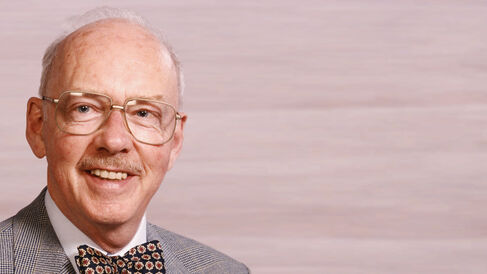
It is with a heavy heart that we report the death of Professor Sir Hans Leo Kornberg on Monday 16th December 2019 at Falmouth Hospital, not far from his home in Brookline Massachusetts.
Kornberg was the Sir William Dunn Professor of Biochemistry and Head of our Department from 1975 to 1995, as well as Master of Christ's College from 1982 to 1995. He was a truly lovely man; kind, gracious, brilliant, distinguished and generous, and his passing is a loss for us all.
Kornberg was born in Germany in 1928, a year before the Wall Street Crash and the ensuing worldwide economic disaster that presaged the inexorable rise to power of the Nazi beasts in 1933. After the obscenity of Kristallnacht, Kornberg fled with his uncle to the safety of the UK, then something of a haven for the disenfranchised and refugees of war and terror. Like many Jewish child refugees, he was forced to leave behind his parents, Max (1889-1943) and Selma (née Nathan; 1886-1943), both of whom were subsequently murdered. Kornberg attended Wakefield Grammar School in Yorkshire and, upon leaving school, he worked as a junior laboratory technician with Hans Krebs, discoverer of the eponymous cycle, at the University of Sheffield. Krebs was himself a refugee from the Nazis who had been 'rescued' by our Department's founder, Frederick Gowland Hopkins, and who had previously worked in our Biochemistry Department. It was Krebs who persuaded the young Kornberg to consider further study, and he graduated with a degree in Chemistry from the University of Sheffield in 1949 and a PhD in Biochemistry on the study of gastric urease in 1953. Kornberg was then a post-doctoral researcher in the USA, returning to the UK to work on the glyoxylate cycle with Krebs, who had by then assumed the Whitley Chair in Biochemistry at Oxford. In 1960, Kornberg was appointed to the first Chair in Biochemistry at the University of Leicester, a post he held until 1975. He then moved to Cambridge to take up the Sir William Dunn Chair of Biochemistry – the very chair created originally for Frederick Gowland Hopkins, who had rescued Krebs, who had mentored Kornberg. In 1995, Kornberg 'retired' (not) and took up a position as a University Professor and Professor of Biology at Boston University in the US. There he taught biochemistry with his usual flair and charisma, the poster child of a University professor – generous, unfailingly polite, caring, tolerant and wise.
Hans Kornberg received many, many honours. He was elected to the Royal Society in 1965 and granted a knighthood in the Queen's Birthday Honours List in 1978 for "services to science". He received some 11 honorary doctorates and was elected to the National Academies of Sciences of the USA, Italy, and Germany.
Kornberg married his first wife Monica King while in Oxford, but she tragically died in 1989. In 1991, he married Donna Haber (Lady Kornberg), who survives him together with his children Julia, Rachel, Jonathan and Simon.
I had the great privilege of meeting Hans Kornberg on a number of occasions – the first time while still a graduate student – but he visited the UK fairly regularly. Our families shared a similar Holocaust refugee narrative, although I was a generation distant and spared the horrors that he himself had endured.
Hans was a role model for us all – an example of how a great heart and a generous spirit can direct tragedy away from rancour to kindness, wit, generosity and dazzling intelligence.
Sir Hans Leo Kornberg, Ph.D. FRS, K.B. (1928-2019).
